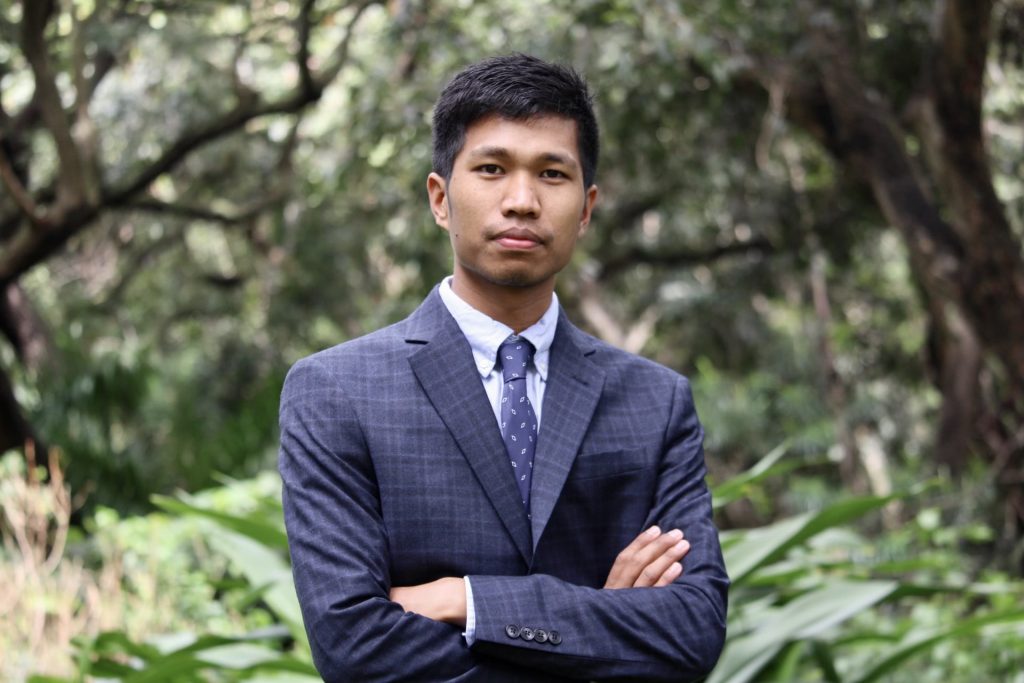Student Spotlight: Kyaw Hsan Hlaing
Kyaw Hsan Hlaing (Asian Studies major) is not like most other UROP funding recipients. At the age of 26 and before receiving his undergraduate degree, he already has an extensive publication record encompassing dozens of news articles in international press outlets and a book manuscript under contract with the University of Hawai‘i Press. He is also a refugee from Myanmar who fled his home country after the February 2021 coup that gave rise to a bloody, ongoing civil war.
“I’m really interested in politics and political transition and conflict,” Hlaing stated. “Perhaps because I grew up under authoritarian rule and with these violences, and I’m even an eye witness to the genocide in my state. So all of these things really forced me to research political transition and ethnic politics.”
Hlaing is originally from Western Myanmar and got his start as a journalist several months prior to the coup, in August 2020, when he and a colleague, Emily Fishbein, successfully pitched a story to Foreign Policy about rising tensions between the Burmese military and the Arakan army. “At the time, there was really intense fighting [and also] the internet shutdown, and COVID-19 outbreak. All these things overlapped at the same time, and there was almost no one writing about it in international media outlets before the coup,” Hlaing said. His article with Fishbein, “To Fight the Coronavirus, Myanmar Needs a Ceasefire in Rakhine,” became the first of many collaborative pieces to be published throughout the next several years in everywhere from Al-Jazeera, to Time Magazine, to The New Humanitarian, to Vice.
Hlaing’s reportage eventually made him a target of the Burmese military, forcing him to relocate. “After the coup, I had to move from place to place to sleep because of all these security concerns. Not just me, other journalists, we were moving all around Yangon,” he stated. “The first week of April [2021], I started to believe that I was no longer safe. Maybe I would be arrested, maybe something would happen to me, so I chose to flee to Thailand.”
After spending nine months in Bangkok and Chiang Mai, he relocated to Washington, D.C. seeking political asylum, where he remained for another nine months, and began applying to American universities. He was attracted to the University of Hawai‘i at Mānoa by opportunities at the East-West Center. “In my case it was really difficult because I couldn’t provide official transcripts,” he stated. “I emailed so many professors and explained about my situation. But it didn’t help me return to school. Fortunately, [the UHM] Asian Studies Department, I can say, saved my education.”
Hlaing’s mentor, Dr. Anna Stirr, stated, “We in the Department of Asian Studies are all learning a great deal from Kyaw Hsan’s firsthand experience and knowledge of Myanmar and very much look forward to the insights his projects will bring, including this UROP-funded investigation of the factors contributing to recent political violence in Myanmar.”
Hlaing’s UROP project, about the failure of political transition and military coup in Myanmar, combines quantitative data from the Assistance Association for Political Prisoners with media analyses, interviews, and case studies to describe how the struggle in Myanmar escalated in recent years and possible routes to peace. “Why are the people of Myanmar [leading] their own struggle, or revolution, rather than non-violence?” Hlaing asks. “After the military coup, in Myanmar, there were more than five hundred new rebel organizations. Not fifty, five hundred organizations. Why do so many of them believe that violence is the only pathway to restore democracy in Myanmar?”
The conflict in Myanmar has deep historical roots in the struggle of ethnic minorities for liberation from the Burmese majority, which rose to power after the departure of the British in the mid-twentieth century. Hlaing believes that the consequences of these struggles inform the current conflict, but his project, as he explains, “looks at the context, not the events. The events in Myanmar, the politics, are changing, so it’s really hard to follow…It changes every day.”
As his UROP project develops, Hlaing also works as a regular columnist for The Diplomat. He’ll be graduating from UHM at the end of Summer 2024, after which he intends to continue his study of political transition and revolution in a PhD program on the mainland. As of this writing, he has been admitted to the PhD programs in Political Science at the University of Texas at Austin and Cornell University, as well as an MA program in international and regional studies, specializing in Southeast Asia studies, at the University of Michigan. UROP has every confidence in his success in grad school and far beyond, and looks forward to the important contributions his work will make to global diplomacy.

